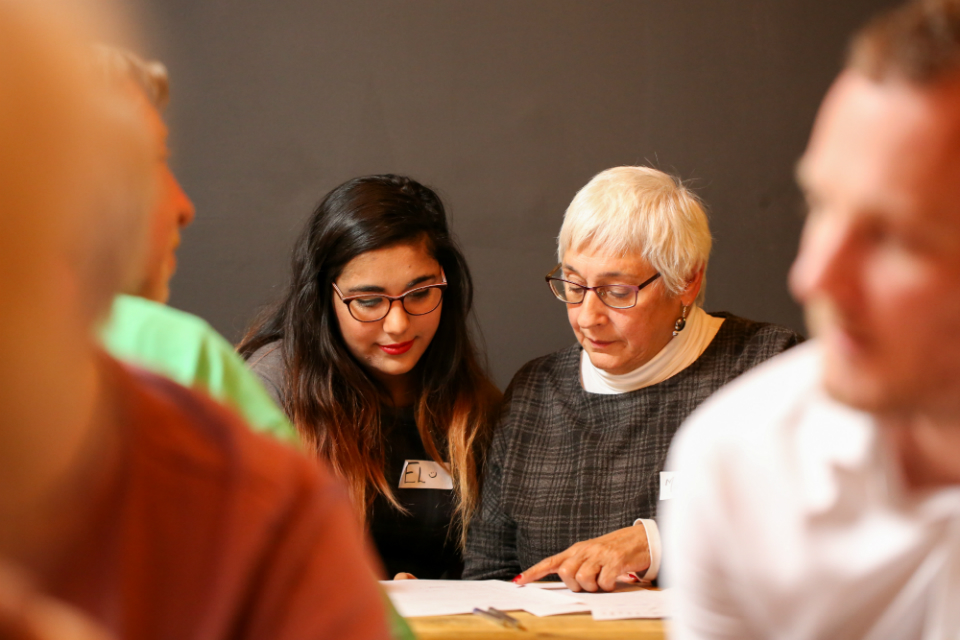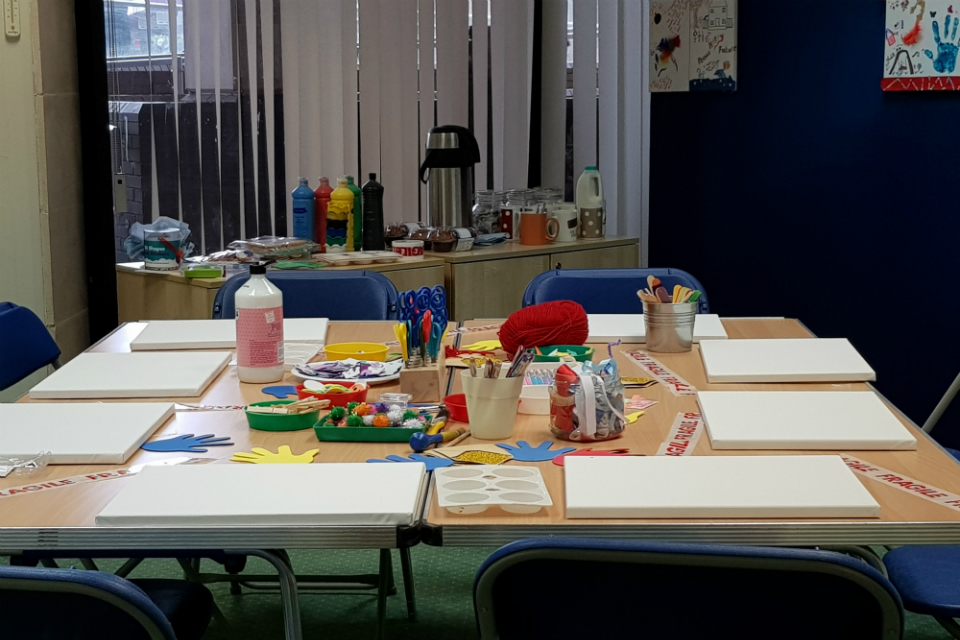3. THE SOCIAL SECTOR: supporting charities and social enterprises
Published 9 August 2018
Applies to England
Introduction
Charities and social enterprises - ‘the social sector’ - are the core of civil society. A healthy, independent, and engaged civil society is a hallmark of a thriving democracy. A robust sector is a sign of a confident democracy, which offers many ways in which citizens’ views and concerns can be amplified. This country has a long tradition of philanthropic organisations, both small and large, set up independently of government to respond to the challenges of society. A poignant example is civil society’s role with regards to combating threats to democracy, ensuring that broad debate and political campaigning continue to thrive, online as well as offline. It is essential that these organisations can access the necessary support to adapt to meet the challenges of the future.
Throughout this Strategy there are proposals that will benefit social sector organisations. For instance, in Chapter 1 we talk about citizens, including young people, in supporting society. In Chapter 2 we describe place-based investment and empowerment. Chapter 4 describes a range of benefits that business, the finance sector and new technology can bring to civil society. In Chapter 5 we explain plans to reform commissioning in favour of charities and social enterprises.
There remains a range of issues concerning the role and management of social sector organisations themselves, which are dealt with in this chapter, namely the sector’s voice, its funding, its leadership, support, regulation, and its digital capability.
Significant steps are already being taken from within the social sector to address these issues. The government cannot and should not ‘lead’ or organise civil society. But the government has a clear role to play, including where only the government can act, or where government intervention has the potential to offer significant additional value.
In particular the government is keen to work alongside the social sector to realise a future in which organisations are able to adapt and thrive, strengthen public trust and find new ways to resource and deliver their missions. This includes all in the sector feeling that their voice is respected in policy debates, where there is strong support available and ongoing and effective investment in leadership and governance. Finally, the government wants charities and social enterprises to be able to employ strong digital skills to deliver social good.
Mission 6: the voice of civil society
The rules on campaigning
Civil society has a long and proud tradition of campaigning for change and providing voice for the disempowered and disadvantaged in society. Civil society organisations have successfully campaigned for changes in the law and national policy, and at local level supporting access to services and challenging public sector organisations to improve.
Charity law enables charities to undertake campaigning, including political activity, to support the delivery of their charitable purposes. Charity law prohibits charities from supporting a political party or candidate. It is also right that we have a longstanding framework under Electoral Law to provide transparency of third party campaigning in the period before an election. This is necessary to ensure that an election outcome cannot be unduly influenced through excessive spending.
Some civil society organisations believe that the space for campaigning and advocacy has closed in recent years, creating a ‘chilling effect’ on civil society campaigning and advocacy.[footnote 44]
Evidence from the engagement exercise is that the government should improve its engagement with civil society, consult charities, and community groups, consider what is said and be transparent about decision-making, include diverse civil society voices in policy development, and that beneficiaries especially young people should be engaged and involved in policy making in a meaningful way. One organisation of many stressed during the engagement exercise that charities “play a vital role in shining a light on key issues and the government should support and champion them in doing this”.
The government is ambitious to play a key role internationally in standing up for free speech and a vibrant civil society.
Hearing from civil society
The government is determined that charities and social enterprises should be fully confident in their right to speak in public debates, and to have a strong campaigning and advocacy role. It is right that we have government grant standards which prevent taxpayers’ money being spent on political campaigning or lobbying. However, simply being in receipt of taxpayers’ money should not inhibit charities from making their voices heard on matters of policy or practice.
The government is committed to embedding open policy making across departments - giving civil society significant opportunities to achieve policy change - and is currently developing a commitment to this as part of the UK’s next National Action Plan for Open Government.[footnote 45]
The government also recognises that there is a job to do to reach a collective approach across Whitehall in the way that we work with and for civil society. We are therefore keen to get our internal workings in order to ensure that we effectively join up at crucial stages of policy development to reflect the voice of the sector and to obtain valuable and early insight into how our policies are likely to impact communities and the sector. As mentioned in other chapters, strong partnership working with the sector is key to effectively deliver policies that tackle a number of issues faced by communities and to strengthen the resilience of the sector.
The government will renew its commitment to the principles of the Compact. The Compact is a document that sets out a series of principles and commitments governing the relationship between the social sector and the government. It was last published in 2010.[footnote 46]
The government will convene a cross-government group to work with civil society to establish the principles of effective engagement in the policy-making process, learning from the examples of good practice that already exist. This includes a focus on the effective engagement of young people (see ‘Young people and national policy design’.
The government will work with civil society, the Electoral Commission and the Charity Commission to explore what other non-legislative steps could strengthen civil society’s confidence in its campaigning and advocacy role.[footnote 47] For example, the Electoral Commission has already started work on improving its third party campaigning guidance for civil society organisations.
Ministerial statement: the voice of civil society

Victoria Atkins MP
Victoria Atkins MP, Parliamentary Under Secretary of State for Crime, Safeguarding and Vulnerability says:
Knowing the issues that affect the most vulnerable in our society is the first step towards finding solutions and bringing justice to a community. Charities and the social sector play a vital role in representing people who are unable to advocate for themselves to ensure that the right policies and programmes are in place to protect the most marginalised in our society.
Imagine living with an aggressive partner - coerced and violently attacked in your own home, sometimes for decades – and too scared to speak out for fear of retribution. Or being trafficked from another country and not being able to make or exercise any choices free from duress, pressure or undue influence in order to protect oneself from abuse, neglect and exploitation. The reality is that there are many people whose individual circumstances preclude them from being able to take part fully in important decisions or even discussions that they themselves are the subject of.
In my previous career as a criminal barrister I specialised in prosecuting serious organised crime so I saw how law abiding people could be exploited by criminal gangs. As Minister for Crime, Safeguarding and Vulnerability, it is my responsibility to ensure the Home Office is taking the best possible action to protect the most vulnerable and prevent exploitation and criminality.
We frequently rely on the charity sector often working in partnership with the police to flag issues that we need to be aware of and we work in partnership with them to decide on the best options going forward. We are committed to introduce a landmark Domestic Abuse Bill to further transform the response to these heinous crimes. We have also recently published a Serious Violence Strategy which sets out the government’s response to serious violence and recent increases in knife crime, gun crime and homicide. The strategy focuses on early intervention and prevention which can help catch young people before they go down the wrong path into situations where they are exploited frequently as drug runners and through threat and violence to prop up criminal networks.
Delivery of the Modern Slavery Act relies on our social sector partners working alongside charities to ensure that supply chains and other situations where bonded labour or other forms of exploitation may be involved are identified and dealt with. We work closely with a wide range of civil society organisations, including specialist victim support services, to support delivery of our work. Freeing the nation from the cruel acts of modern slavery and other forms of exploitation remains a priority for the Home Office and the UK government and it is only by working in partnership that we can achieve our aims.
Mission 7: funding and financing the social sector
Diversifying funding and finance
The social sector has experienced major turbulence in the funding environment in recent years. Diversification of income is often the way that social sector organisations are responding to this turbulence.
The picture on civil society funding and finance is a mixed one. There are positive signs about the social sector’s overall financial health. Figures from the National Council for Voluntary Organisations Almanac show that overall income for charities is up since 2009/10, and in 2015/16, total income reached £47.8 billion, an increase of £1.6 billion from 2014/15. However, the largest 3% of organisations receive 80% of the sector’s income and only 18% of organisations (those with an income of £100,000 or more) saw their income grow in 2015/16.[footnote 48] This is creating considerable income disparity between small, local charities and large, national charities.
The way that civil society organisations are funded by central and local government has also changed with contract funding increasingly replacing grant funding. However, a range of new funding opportunities has emerged which supports small and local charities. There has been a 10% growth in earned income (trading) in the small charity sector.[footnote 49] Since 2012, following policy direction from the government, Big Lottery Fund has focused almost exclusively on supporting local civil society, particularly by empowering people to play an active role in their communities.[footnote 50] New technologies and a renewed focus on place and communities are offering opportunities to enhance the funding and finance environment. The government will continue to explore opportunities, working with sector partners, to make access to funding and finance easier, particularly for the small social sector and community organisations. This will include exploring the potential of technology. Adding to this growing momentum in social impact investing in civil society has created several valuable income streams and improved access to finance. The government is keen to use various tools to support the future funding and finance environment for the sector. Promoting philanthropy, ensuring taxes and regulation support civil society, and bringing different sources of funding and investment together for social impact, are all ways in which the government will support resilience and increased impact of the sector.
A supportive policy environment creates the opportunity for social investment to support civil society, but that opportunity can only be realised if there are sustainable social business models in which it is possible to invest. Existing social organisations and new social entrepreneurs often need help to develop and grow these models, through some combination of national and local support.
The Department for Digital, Culture, Media and Sport is supporting the development of enterprise activity to grow and diversify income, and improving access to social investment for charities and social enterprises through a £60 million endowment to Access (The Foundation for Social Investment). Under its new 2018 to 2023 strategy, the Access Foundation is committing £40 million to help charities and social enterprises to develop enterprise models which help increase their earned income and thereby build resilience.
The government also supports building the awareness and understanding of social investment through its partnership with the Access Foundation to fund GoodFinance.org.uk. Good Finance provides charities and social enterprises with a comprehensive digital resource to help them effectively navigate the social investment market. There is also a growing movement of what is called blended finance, in which a mixture of funding from different sources is made available, on a variety of terms, to single projects or initiatives.
The government has partnered on funds like the Arts Impact Fund, Dementia Discovery Fund, Northern Cultural Regeneration Social Investment Fund, and Building Connections Fund which have all attracted a mix of funding from different sources to collectively focus on a specific theme or issue.
The government announced in January 2018 that up to £10 million of funds from dormant accounts will be allocated to the Access Foundation to support blended capital approaches. The government will continue to work with funders to create co-investment opportunities to fund solutions to social challenges.
There has been great progress over the last decade to grow access to repayable finance. The government will continue to support innovative approaches which bring together these different types of finance.
Philanthropy
Philanthropy is a vital income stream for civil society. The UK public donated £10.3 billion in 2017.[footnote 51] Legacy giving alone is worth £2.5 billion per year and payroll giving is consistently over £1 billion.[footnote 52] These generous amounts make up about 40% of social sector income.[footnote 53]
There are opportunities to build on the generosity of individuals and grow philanthropy even further. The government aims to make giving as easy and as compelling as possible, and has a strong track record in this area.
Our Small Charities Fundraising Training programme helps to equip staff at small charities with the skills needed to attract and engage a greater range of donors. Major match funding programmes, such as the Community First Endowment Match Challenge, encouraged donors to invest in an endowment now worth in excess of £140 million, and which provides around £5 million a year in grants for communities.
The government is working with the Charity Commission and UK Community Foundations to release at least £20 million over the next two years from inactive charitable trusts to grassroots community organisations.
The government recently convened a cross-sector roundtable to provide advice on how the government can support the growth of giving and the strengthening of the UK’s role in global philanthropy, with a view to establishing a longer-term advisory group. Although the government should never seek to influence or direct the way that private philanthropy is directed, the government is ambitious for the UK to become the global centre for philanthropy practice, including the role of corporate philanthropy.
The government will explore how to encourage more collective giving, a collaborative, peer-influenced form of philanthropy that has the potential to develop larger funds to tackle problems. Initiatives include issue-based funding networks, such as the Environmental Funders Network, the Rough Sleepers Funding Network, and the place-focused London Funders model, and we will look to see how the government can support this movement to grow.
The government and the social sector also need to learn the lessons from the public response to the Grenfell Tower disaster, when £28.4 million was donated to support the community affected by the fire. The sector rose to an incredibly challenging situation with extraordinary capability (see ‘Civil society and disaster response’).
The growing focus on place-based work in public policy is reflected in an emerging model of local philanthropy, including ‘civic philanthropy’ programmes supported by city mayors. Place-based giving schemes bring together local philanthropists and funders with the community and local voluntary groups to raise money to tackle local issues in a particular place, such as rough sleeping, activities for young people or social isolation, or serve as investment funds for larger scale infrastructure projects. A culture of philanthropy in local areas is common in the United States. It was common in the Victorian era and left an important legacy in many of Britain’s towns and cities. As an organisation told us during the engagement exercise: “a 21st century version of civic philanthropy would empower local people to adapt to the challenges of the future, be a catalyst for growth and development, and help reinvigorate a sense of civic pride, shared identity and belonging in Britain’s cities”. The key now is to build strong local philanthropic roots that enable everyone, whatever their level of wealth, to be able to give and contribute to a local response to local issues.
The government will invest over £750,000 before 2020 in the growth of place-based giving schemes, to support civic philanthropy, informed by research commissioned by the Department for Digital, Culture, Media and Sport in 2018. This funding will support areas to develop schemes that bring together local funders, philanthropists and businesses with civil society organisations and residents, to tackle local needs in a collaborative way.
Tax and regulation
The government is already supporting charities with considerable tax exemptions and reliefs. Provisional figures from Her Majesty’s Revenue and Customs for 2017-18 indicate the total amount of relief to charities is estimated to be £3.62 billion, which is an increase of £220 million on the previous year, continuing the long-term upward trend. Ten years ago, reliefs to charities totalled £2 billion.
The government has committed to reviewing the Social Investment Tax Relief in 2019.[footnote 54] Reducing restrictions on the size and type of projects which can claim Social Investment Tax Relief could accelerate communities taking ownership of important community assets and expand the use of small scale finance for community energy projects. In these areas Social Investment Tax Relief could play a bigger role in helping social sector organisations to be more financially resilient.
The government also recognises the strong demand from the social enterprise sector for a simpler relationship with Whitehall. The Department for Digital, Culture, Media and Sport will establish a regular forum for social enterprises to coordinate relations with the government.
Case study: Big Lottery Fund
The Big Lottery Fund is the largest funder of community activity in the UK. This brings it into close contact with civil society every day. It distributes money raised by the National Lottery to thousands of organisations across all parts of the UK every year. Its approach to grant-making now focuses on the skills, assets, and energy that people within communities bring, and the potential in their ideas. The Fund believe that communities thrive when people are in the lead. In 2010, the government agreed with the Big Lottery Fund that the large majority of its funding should go towards civil society. Since 2010 over 95% of its funding, some £5 billion, has supported civil society organisations across the UK.
Over the next three years the Fund will commit over £1.5 billion of funding raised by the National Lottery to civil society across the country, in addition to a range of joint funding initiatives with the government and other partners. The Fund has also been investing in strategic programmes in England to improve collaboration between civil society, the government and the public sector more broadly, in areas such as early years development, adolescent mental health, and older people. Representing over £500 million of funding over 10 years, these strategic programmes are driven by 58 place-based public, private, and social sector partnerships. They are already beginning to yield lessons with the potential of informing policy and practice.

Photo credit: Big Lottery Fund and Manchester Cares Project
Mission 8: leadership, support and regulation
Leadership
Many social sector organisations are responding well to their changing operating environment, for instance by increasing their income from trading. This demands the best possible leadership from both trustees and, where they are in place, chief executives.
One organisation that contributed to the engagement exercise stated that “if we want to strengthen civil society, a good place to start is to invest in these 160,000 chairs who are already there: skill them up, resource them, support them.”
The government funded jointly commissioned research by the Charity Commission, Cass Centre for Charity Effectiveness, Cranfield Trust, and National Council for Voluntary Organisations to investigate trustees’ understanding of their role and duties, and the sufficiency of sources of advice and guidance. This research confirmed a need to invest in key skills, for example legal, digital, and fundraising.
The joint research also found a significant lack of diversity amongst trustees and highlighted informal recruitment practices, which make it harder for people from different backgrounds and with different skills to get involved.[footnote 55]
We have also heard that time poor charity chief executives, focused on maintaining frontline services, feel unable to invest in their development. Generally charities report a need to develop key skills, but state that cost and ability to take time out prevent them accessing training.[footnote 56] This is a particular challenge for small and medium sized organisations. The 2013 review of Skills and Leadership in the voluntary, community and social enterprise sector stated that “Organisations can feel guilty about spending money or time on leadership development […] All of us are collectively better off, including our beneficiaries, if we avoid this narrow thinking”.[footnote 57]
There are many great examples of strong leadership across the social sector, and significant civil society led efforts underway to spread best practice and strengthen leadership and governance. However, we believe that the government has a role to play in supporting these efforts to help drive the pace of change.
The government will convene key civil society stakeholders over the next year, to explore the potential for a common vision and mission for strengthening the leadership of social sector organisations and the potential for specific government interventions.
The government will work with civil society stakeholders and the Charity Commission to explore and agree on collective action to open up trusteeship to people from different backgrounds and with a broad range of skills, and encourage more young people under the age of 30 to become trustees.
Local support system
Just as business depends on available infrastructure to flourish, like transport and finance systems, social sector organisations depend on an appropriate support system. This includes the right people and networks, information and advice, knowledge and skills, adequate and affordable places to work from, and opportunities and incentives to collaborate.
Some of this support can be delivered at a national level, but there is an important role for support that takes account of the local context. One respondent to the engagement exercise described the core purpose of local support providers as “to develop and support a thriving local ecosystem, where a diversity of charities and community groups can bring about social change.”
Such support can help ensure representation for disadvantaged local communities, provide a voice for the smallest social sector organisations, and help to support local partnership working.
Despite the value of local support the current model, largely made up of Councils for Voluntary Services, faces significant challenges. The 2015 Independent Commission on the Future of Local Infrastructure found that “good quality infrastructure support is not universal”.[footnote 58] It also highlighted a rise in demand for support and a decline in resources, which would mean that even the best infrastructure bodies will need to find new ways of working. These concerns were reflected strongly in the engagement exercise for this Strategy.
The social sector should have access to a robust, diverse, and effective support system. Realising this vision is a challenge that will require a collective effort, which the government believes should be led by the social sector. However, we recognise that we have a role to play in supporting this effort, by convening key players and contributing to the discussion on solutions.
The government will convene key stakeholders to explore how we can collectively help to develop strong local support systems for social sector organisations. This process needs to look at what has worked in the past, what is working now, and how this can be improved. It includes considering alternative models of support, drawing on capacity, knowledge, skills, and resources from across sectors.
Charity regulation, transparency and safeguarding
The government has an ongoing role to ensure that the regulation of charities is fit for purpose, including ensuring that the regulator is appropriately resourced and that we reduce the regulatory burden where it is appropriate to do so. In addition to this core work, in recent years we have taken steps, in partnership with the charity sector and the Charity Commission, to respond to challenges that have emerged around fundraising and safeguarding.
The Fundraising Regulator has shown that independent non-statutory regulation by consent can protect the public interest. Its Fundraising Preference Service has given people more control over the fundraising approaches they receive from charities. It has also recently introduced new transparency requirements for online fundraising platforms, to ensure that members of the public are clear about fees and charges before they set up a fundraising page or make a donation.
Safeguarding summits in March and June 2018 for UK charities agreed that strong safeguarding is about having the right leadership, culture, policies, and processes in place. The focus is on protecting people at risk whether young or old and whether they are service users or staff and volunteers. Charities are leading the work supported by the Charity Commission and the Department for Digital, Culture, Media and Sport. A parallel work stream led by the Department for International Development is considering safeguarding in the international development context.
The government will further develop and implement measures to strengthen safeguarding in charities, including new guidance and support to help charities.[footnote 59]
On fundraising, the government will review the operation and impact of the Fundraising Regulator, the self-regulatory body tasked with setting and enforcing high fundraising standards.[footnote 60]
The Charity Commission is widely respected for its knowledge and expertise in charity regulation and its independence. The government will work with the Charity Commission to explore options for placing it on a secure and sustainable financial footing and ensuring it is adequately resourced to meet future challenges.
Case studies: civil society and family support
Civil society has a critical role to play in helping families who require support. Countless civil society organisations across the country provide a vital lifeline to families which are in need.
Chelmsford Central Family Hub
Chelmsford Central Family Hub provides support for families with children aged between 0 and 19 under one roof and actively connects them with the social sector and other services across Chelmsford, including in other ‘delivery sites’. Virgin Care run the hub, which is based in the inclusive and non-stigmatising environment of the city library, in partnership with Barnardos.
Through this hub and spokes model it’s a nerve centre of the city’s support system, where families who would otherwise struggle alone can find the help they need and thereby overcome the barriers currently stopping them from doing well at school, thriving in work and flourishing in their relationships.
The wide range of early help includes coffee drop-in sessions where parents can build their own support networks and share advice, as well as evidence-based parenting support for children across the age range. The Hub provides access to superb early years services such as health visiting, breastfeeding support, ‘rhyme time’ which boosts the development of infants’ communication through singing, interaction, and movement and help to address fussy eating in toddlers. Parents are also supported to overcome drug and alcohol problems, improve their mental health and stop smoking.

Photo credit: Chelmsford Central Family Hub
Save the Family
Save the Family is a charity founded over 40 years ago to support families with multiple and complex needs. This includes providing residential accommodation and support for troubled families that are homeless, at risk of becoming homeless or are fleeing domestic abuse. The organisation is based outside Chester and has 26 self-contained residential units, a community hall, sports hall, training kitchen, creative space, and a Children’s Centre including a library and Sensory Room. Almost half of the families are referred from within Cheshire West with others from the Wirral, Merseyside, Warrington, Cheshire East, and even Manchester. A tight mesh was embodied in the charity’s day to day methodology that enabled families to be reunited with their children either by being brought back out of care or preventing them entering the system in the first place. It was necessary for the founders to think ‘outside the box’ and not along traditional lines.
Save the Family spends time with families, preparing and mentoring them for independent living. The charity achieves this through skilled role-model family mentors and by teaching basic life-skills as well as essential daily and weekly routines. Save the Family helps to bring the family back together and prepare it for multi-agency support as well as the move back into the community. The charity strives to address homelessness, family breakdown, domestic abuse, alcohol and substance misuse, debt, mental health, child protection, and poor parenting, with support from mentors to develop their parenting skills. This can only be accomplished by establishing trust between staff and family members.

Photo credit: Save the Family
Safe Families for Children
Safe Families for Children is a charity working hand-in-hand with children’s services to link families in need with a network of local volunteers who can offer them support. The organisation accepts referrals from partnering local authorities, matching struggling families with caring volunteers in their area who can provide tailored help and ‘wrap-around’ care. Involvement with Safe Families makes a crucial difference for some families in preventing the need for children to go into care.
Safe Families for Children has a strong relationship to churches in local communities, which is where it finds most of its volunteers. Safe Families is a very broad-based organisation spanning all the major church denominations and traditions – Anglican, Catholic, Baptist, Methodist, Pentecostal, Reformed etc. They recruit mentors from faith groups to help house and mentor mothers who lack parenting skills and who would otherwise be in local authority care at a cost of £2,000 per week.
To date, Safe Families has provided over 4,000 respite bed nights to children in the UK, with thousands of children benefiting from the support.

Photo credit: Safe Families for Children
Mission 9: a social sector confident with digital
Digital
Digital is the way of using modern technologies to transform your business process and engagement with users - to enable new opportunities and possibilities.
Throughout the engagement exercise participants highlighted that digital technology offers unprecedented opportunities for the way in which we approach social challenges. On a daily basis we witness technology’s role in transforming the way we communicate and connect with one another, from digital platforms that build and sustain communities, to fintech applications that help people to donate, through to campaigning for good causes using emerging technologies like virtual reality.
Digital technology does not bring progress when it simply creates efficiency. It brings the most progress when it puts the user first, and when digital services are focused foremost on meeting human needs. As one organisation argued during the engagement exercise: “Unless they stay abreast of technological advances, non-profits will be unable to champion and safeguard the most disadvantaged in society […] By acting right now to support non-profits to embrace digital, we have the chance to reinvigorate a sector that many feel has lost its way and make it not only fit-for-purpose but leaders in a responsible, ethical society.”
That is why it is essential for the social sector to be part of the digital revolution, and why the government is committed to bringing together digital and civil society.
The use of social media, big data, and artificial intelligence are beginning to reach the social sector and there is increasing awareness that adoption of digital techniques can make charities more resilient and sustainable. But the rate of adoption is slow by comparison with other sectors.
While 62% of charities are taking active steps to improve the culture so digital can flourish, only 9% of charities say that everyone in the organisation understands and is on board with the digital vision. 72% of charities see digital’s potential to deliver their strategy more effectively yet only 32% have a strategy for how digital can help achieve their goals. 2% of charities (around 3,500) struggle to access basic digital tools and 26% find it hard to attract or retain digital talent.[footnote 61]
While some charities are already capable of pushing the boundaries of technological innovation, the government recognises that digital needs in the social sector are diverse. Digital maturity varies greatly between organisations, and the 2017 Lloyds Business Digital Index demonstrated that the digital skills gap between large and small organisations is only widening.[footnote 62] Therefore a multi-faceted approach is needed in order to close the gap within and between this sector and others. The government welcomes the Big Lottery Fund’s intention to launch a new £15 million digital funding programme to support applications from organisations seeking to maximise the opportunities that digital offers.[footnote 63]
The government’s Digital Strategy set out a range of measures designed to strengthen local communities. These included investing in local digital infrastructure to ensure places are well-connected, investing in skills development to support individuals to fully participate in their local digital economies, and creating a better dialogue between communities and government by engaging with citizens and business around the UK using better, more coherent digital platforms.
To ensure our communities are connected, the government will implement measures from the Digital Economy Act. This will support civil society organisations and their beneficiaries in accessing high quality, fast, digital services.
The government will promote the role of technology in helping to create social good, emphasising its ability to drive growth, enrich lives, promote Britain and address policy challenges across government and society. To ensure that civil society is up to the challenge, the government will invest in digital skills in a number of ways. The government has recognised the synergies between technology and cultural organisations in our Digital Culture Report, and have thereby invested £1.1 million through Arts Council England to create a Digital Culture Network. This Network will share expertise and best practice to build digital capability in arts organisations, facilitating partnerships and collaboration between its funded organisations and the tech sector.

Technology
The government has also committed Arts Council England to work with Heritage Lottery Fund to create a Digital Maturity Index for the cultural sector, to enable organisations to understand and benchmark their own digital capability and set plans in place to make improvements.
The government has already committed around £200,000 to the Small Charities Fundraising Training programme, led by the Foundation for Social Improvement. This provides staff at small charities with the training they need to fundraise effectively, for example, by developing their online presence and using online tools.
The government will work with the Centre for Acceleration of Social Technology (CAST) and other partners to explore how best to build a responsive, resilient, and agile social sector.
The government will continue to work through the Digital Skills Partnership to help civil society organisations to build their skills, boosting collaboration between the government, civil society, and business to tackle the digital skills gap. The Office for Civil Society will work through the Digital Skills Partnership’s Digital Enterprise Delivery Group, specifically chairing the task force focused on building digital confidence in charities. The Department for Digital, Culture, Media and Sport will explore what support and provision has been put in place for Small and Medium Enterprises and apply this learning to civil society organisations who often face similar challenges.
The government will continue to support the establishment of Local Digital Skills Partnerships, which bring together stakeholders from local government, civil society, and business to address digital skills gaps and increase digital inclusion. Two Local Digital Skills Partnerships have been set up so far and the government will be helping more to launch.
The government will support the development of an effective Charity Digital Code of Practice for charity leaders and trustees, developed by Zoe Amar, Office for Civil Society, Charity Commission, National Council for Voluntary Organisations, Association of Chief Executives of Voluntary Organisations, Wales Council for Voluntary Action and Small Charities Coalition among other sector partners.[footnote 64]
The government will work with sector partners to deliver a #DigitalTrustees campaign to promote digital confidence on charity boards.
Case study: Centre for Acceleration of Social Technology (CAST) - helping people use digital for social good
CAST works to increase the resilience, responsiveness, and impact of charities of all sizes across the UK by creating a step-change in their use of digital. From light-touch mentoring to intensive service design, CAST and its cross-sector partners are helping charities to use digital tools and techniques to transform their strategy, services, and culture.
Since its launch in 2015, CAST and its network of partners have supported thousands of charities and social enterprises, helping them to break out of old patterns and silos, respond more effectively to their users, and collaborate with other charities in reusing existing tools and creating new shared solutions that meet their users’ multiple and complex needs.
Breast Cancer Care, seAp, Age UK and SafeLives are among the many charities that have benefited from CAST’s support, using digital to re-think their practices and engage users in the design of new services:
- Breast Cancer Care’s BECCA app, which responds to the well-evidenced need for providing emotional support after clinical treatment has ended, has engaged 15,000+ users in just one year and aims to support 36,000+ women by 2020. The plan for the coming year is to open source BECCA’s code for other charities to use, not just within the health space but across the sector
- seAp works to protect the rights of society’s most vulnerable people, ensuring they get the health and social services they need. Using an interactive website that is anonymous, free and accessible to those with multiple social exclusions, seAp has moved from supporting 100 people in the disability benefits assessment process to more than 206,000, multiplying their client reach 2000 times for just 10 times the level of investment in their face-to-face service
- Age UK’s tablet-based tool, Steps, enables care workers to conduct guided conversations with older people that uncover their health and social needs, helping to create personalised action plans for greater independence
- SafeLives has created the #EveryStoryMatters campaign to capture voices (through written, video, and audio uploads) of domestic abuse survivors, which has helped them to place their users front and centre of designing new services and advocacy programmes. This is one example of how SafeLives is achieving its ambitions much faster, more cheaply, and more effectively by embracing digital

Photo credit: CAST
Ministerial statement: education and civil society

Damian Hinds MP
The Rt Hon Damian Hinds MP, Secretary of State for Education says:
Education is about more than the lessons children need to pass exams. They also need to develop the wider knowledge, values and attributes that will enable them to engage positively with their peers and society, and be prepared for adult life - both inside and outside of the workplace.
This happens outside the classroom as well as in it. That is why good schools work with local charities and businesses, to give students the real-life experience, contacts and character they need to succeed.
That’s why I want schools to be at the heart of the communities they serve, so children grow up with all the skills they need to flourish as adults.
-
The Sheila McKechnie Foundation undertook a survey of civil society campaigners in 2017. There were 151 responses, of which 90% thought that there are threats to the legitimacy of campaigning; 63% cited “senior managers and trustees being more cautious about campaigning”, Campaigner Survey, Sheila McKechnie Foundation, 2017 ↩
-
‘Open government’ [collection], 2018; UK wide ↩
-
The Charity Commission works across England and Wales. ↩
-
‘UK Civil Society Almanac 2018’, The National Council for Voluntary Organisations, 2018 ↩
-
‘Taking the Pulse of the Small Charity Sector’, Foundation for Social Improvement, 2017; ‘UK Civil Society Almanac 2018’, The National Council for Voluntary Organisations, 2018 ↩
-
The UK Government issues Policy Directions for the Big Lottery Fund’s UK-wide and England funding portfolios. Big Lottery Fund receives separate Policy Directions from the devolved administrations with respect to its funding in Scotland, Wales, and Northern Ireland. ↩
-
‘UK Giving Report 2018’, Charities Aid Foundation, 2018 ↩
-
‘Legacy Giving 2017’, Legacy Foresight, 2017; ‘Facts and Figures: legacies for charities’, nfpSynergy, 2017; ‘Payroll Giving Schemes 16/17’, HMRC, 2017 ↩
-
‘UK Civil Society Almanac 2018’, The National Council for Voluntary Organisations, 2018 ↩
-
UK wide. ↩
-
‘Taken on Trust’, Charity Commission, 2017 ↩
-
‘Small Charities Sector Skills Survey 2016-17’, Foundation for Social Improvement, 2016 ↩
-
‘Dame Mary Marsh Review of Skills and Leadership in the VCSE Sector’, Cabinet Office, 2013 ↩
-
‘Change for Good: Report of the Independent Commission on the future of local infrastructure’, NAVCA, 2015 ↩
-
The Charity Commission works across England and Wales. ↩
-
The Fundraising Regulator holds the Code of Fundraising Practice for the UK. It regulates fundraising in England, Wales and Northern Ireland. ↩
-
‘The Charity Digital Skills Report 2018’, Skills Platform, 2018 ↩
-
‘UK Business Digital Index 2017’, Lloyds, 2018 ↩
-
This programme will be funded by the Big Lottery Fund’s UK Portfolio, and will be open to applications from organisations UK-wide. ↩
-
The Charity Digital Code of Practice will be used in England, Scotland and Wales. ↩
